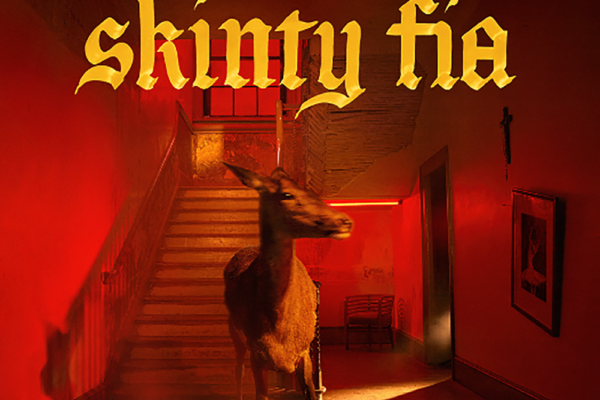Like certain good books, a strong rock record can make you crave a conversation with the mind who made it; just one chance to ask how certain words came to them and how the final sound was forged. We were lucky enough to have this opportunity with none other than Jeff Angell, the Seattle singer, songwriter, and guitarist known for his work in Post Stardom Depression, The Missionary Position, and, of course, Walking Papers – the supergroup who just released their searing second record, WP2, last month. Among the album’s most striking features is the ever-enticing mix they’ve achieved; a delicate balance of incendiary live energy with a touch of studio polish. As you’d guess from spinning it, throughout the album’s production, Angell was laser-focused on getting this exact quality just right – but not too perfect.
“Sometimes, people get carried away in the studio to the point to where they make it so perfect that it becomes sterile,” Angell observed. “I think when people get into the studio, whether it’s putting the microphone in a coffee can or something, they’re always trying to find some new ways of reinventing the wheel. And after they get through that, then they start realizing, ‘Well, this doesn’t have the energy of what we sound like on stage or in our practice room.’ So I think it’s kind of a struggle to have both at the same time. Because if you start going too live with it, then it sounds so raw that there’s not a world inside there; it’s just a rowdy band. But on this record, I think we kind of achieved both, which is something I’ve been trying to do for a long time.” Assessing the industry’s advancements on the whole, he added, “I actually think it’s almost ruining old recordings, because after listening to new recordings, you’re expecting everything to be perfect. And then you go back to an old record, and you go, ‘Man, those guys sure are slowing down the tempo there!’ or, ‘That guy’s a little bit out of key!’” he laughed. “But that human energy is more exciting. Some of the plastic perfection is interesting at first, but it doesn’t seem to have the lasting power that humanity does.”
Walking Papers’ present lineup, and the one that breathed life into WP2, is an undeniably talented one – with Angell on lead vocals and guitar, Barrett Martin (of Screaming Trees, Skin Yard, Mad Season, and Tuatara) on drums, Guns N’ Roses bassist Duff McKagan, and keyboardist Benjamin Anderson (also of The Missionary Position) – and as Angell explained, this synergy made for some excellent source material. As WP2 was being conceived, he often recorded snippets of his bandmates jamming using his phone, then used those pieces to write the songs; ultimately pitching his bandmates’ ideas right back to them. “Sometimes, being a songwriter is more like being a librarian, in a way,” said Angell. “You’re kind of finding all these ideas and then filing them away, and then you have to try to remember where they’re at. Part of capturing that live energy is capturing that magic that happens when people are being spontaneous. Science shows that molecules – and of course, we’re all made up of molecules – react differently when they’re being observed. It’s the same way with people. The good thing about technology is, now we have the ability to keep these little computers in our pocket and say, ‘I’m gonna record that.’ So you can archive those things.”
While one could rightfully feel a bit intimidated working with such seasoned, acclaimed rockers as Martin and McKagan, Angell noted it’s not at all a high-pressure atmosphere – unless the pressure is coming from him. “They’re both amazing musicians. But the more that you’re in the industry, you know that there’s so much luck and timing involved. I mean, by far – by really far – some of the most talented people that I know, that have written the best music, never got a break. The best guitar player I know is a plumber. The best songwriter I know works at Ross Clothes for Less [sic]…you know what I mean? They just haven’t been in the right position, or the music industry’s changed, or people want something that sounds familiar and these guys are too far out there. I think, a lot of times, people measure success with talent, and it isn’t always true. So, it was cool to be playing with Duff and Barrett, but really, they’ve just had different musical experiences. There’s some tension; but if anything, the tension comes from them being kind of casual about it, because they’ve had huge success. Whereas to me, it’s really important to me to make sure everything’s getting the attention it deserves. Sometimes they’re like, ‘Let’s get on with it,’ and I’m kind of like, ‘I don’t think that’s good enough.’ You know, you’re measuring our records against Mad Season and Appetite for Destruction. I don’t want my record to suck,” Angell said with an honest laugh.
He was equally open about the future of the band, noting some possible changes that have not yet been widely reported. “I don’t think Duff will be joining us for much anymore. We played some shows here with a different incarnation, and it was really exciting,” said Angell. “We had a horn section, different bass player, different guy playing guitar, and it went really well. Duff’s amazing, and he definitely contributed to this record quite a bit. But we’re going to see where it goes,” he said, noting McKagan’s contractual and tour-heavy timing commitments to Guns N’ Roses. When asked if they had collaborated with Pearl Jam’s Mike McCready – who guested on their debut album and even joined Walking Papers for a few live shows – on WP2, Angell said, “I think we could have. We already kind of had our own parts figured out, the way it worked out this time. But I would be grateful to play with him again.” On the whole subject of lineups, he seemed to possess a uniquely flexible approach. “I think songs are captured on an album, but songs also tend to grow and change as they go on. If you put different instruments to the harmonies and melodies, you find, a lot of times, that the songs can even improve from when you first recorded them.”
While Angell mentioned that the lyrics are his proudest achievement on this album, he didn’t shy away from critiquing his own work. “I don’t really worry what people think,” said Angell, “but I have had songs before that are misinterpreted. Sometimes, I think that in some of the songs, I didn’t succeed in getting the whole picture. Like in the ‘King Hooker’ song; it’s about a girl who’s a sex worker, but I wasn’t able to define that the chorus is actually the mom of the girl – those words are from her perspective. I couldn’t find a way to put that in there. Sometimes you run out of verses, and sometimes I have whole backstories that go along with these songs. So you’re trying to put it all in there, but you can’t,” he admitted. “I think the song is more of a character study. Someone could maybe think that the song is kind of glamorizing things, but the reality is, it’s about the sadness of the people who know these people, more than the people themselves. Sometimes the songs have dark characters, or there’s tragedy in there, but in my heart, I feel compassionate or empathetic for those characters. I don’t necessarily agree with them.”
Digging deeper into the lyrics, Angell reflected on where many of WP2’s most vivid depictions originated. “This record was inspired a lot by touring and being away from home. Listening to it in hindsight, I can see that there’s a lot of temptation, validation, and redemption. That’s what I hear later, you know? At the time, I didn’t realize it at all. But when I listen to it later, I can see what was going on in my head; what kinds of things were grabbing my attention,” he explained. “I’m probably every character in those songs in one way or another. The only difference is, I don’t let those feelings or inclinations out into the public. It’s better for me and the world that those characters stay in the song. I’m a sober guy for nine years now, and I was in a real bad way before that, and every day I deal with that. I mean, I get better at it, but I feel like that’s kind of my lot in life. Everything goes through this filter of…first getting a bad idea, then me telling myself it’s a bad idea and why…and then I get on with myself. So now my bad, scary, dark self just exists in the songs, I suppose.”
Following the topic of his admirable sobriety, Angell made light of the irony of being interviewed by a publication called Pancakes and Whiskey, leaving us with a great alcohol-free recommendation to pass along to our readers. “So, on the other side of it, with pancakes,” he said with a laugh. “if you ever get pancakes or French toast… cream cheese! Try some cream cheese on there instead of butter. That’s my pick.”
Before you stock up on cream cheese, you can find WP2 here or on Spotify, and follow Walking Papers on Facebook and Twitter for more news about their music.
Author: Olivia Isenhart
Cover Photo: Shayne Hanley




